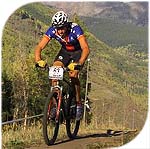|
|
| Seven strategies for successful progress | |
Most of you could ride almost as well as World Champion Roland Green. You could probably not beat him in a cross-country race, but, properly prepared, you could approach your potential as Green approaches his. While each of us is born with specific genetic gifts for off-road cycling, most of us have the ability to fully realize our promise if we go about our training with intelligence and restraint. With the new season soon upon us, there are resolutions we can make that will offer you a fitter, healthier life and allow you to be a better cyclist. Whether you choose to try to maximize your potential or simply obtain the greatest practical benefit from your cycling, the results will depend upon how you train. Here are several strategies for continued progress this season. Practice the hard/easy principle. Do not go out and ride the same workout day after day. All training should include stress and recovery days. On your hard workouts, you improve by stressing your body. On your easy days you allow your body to recover for the next hard day. While these rides may be the same distance as your normal rides, they are slower and easier. Look at the trees on these rides. Failure to improve in the events you enter or in your training program is usually the result of increasing the intensity or distance too often in weekly training. Pace yourself in events. "Blowing up" a term often used to describe the state you're in when you fail to pace yourself and are left with little or no energy to continue an event. If you want to finish your next race strongly, you have to save a little for the end — especially when your competing in unexplored territory where you haven't tested or proven your ability to go the distance, at any pace. During training and shorter events, practice your pacing, drinking fluids and eating to ensure you enter the last few miles and finish strong. You only have to find yourself miles from the finish, dehydrated and low on muscle fuel, once to learn the hard way. It is like trying to cross the desert and thinking you can reach the next gas station. Sometimes the outcome does not justify the risks. Introduce variety into your program. Change your training routines occasionally, and use some plan for varying your training volume and intensity. You won't get stale or bored. Many of the top professionals in our sport plan out their whole year well in advance to ensure variety in their program. Practice to improve your weaknesses. It is necessary to tailor your training to your goals, abilities and your daily work routine. Practice your weakness most often, not your strengths. If you are a weak climber, be sure to practice climbing at least once per week. Almost as important, you most be strong enough to say no — no to an invitation to ride when you know it is not in your best interest; no to ride faster or harder when you had not planned to do so, etc. Cycling with a training partner has its benefits, but it can also have its drawbacks. Keep up with new ideas in training, nutrition and equipment. Read about the latest training programs and techniques of the best in the sport. See what they eat and drink in races. Attend a training camp taught by the pros. But remember that there are no real magic training formulas or miracle supplements. No off-road cyclist has reached the podium without a lot of hard effort. Set realistic goals. Develop yearly goals that are realistic and well within your abilities. If you have been wanting to break into the top 10 and haven't, there is probably a good reason. Why not shoot for a top 10 finish in five local events as your first goal, and gradually work your way up to national event over the season. If you do not reach it this year, then set it for your goal next year. One more year of conditioning and miles in your legs will better ensure your success. Pick only one or two times per year to reach a peak. By definition, no one can maintain peak condition for many months. Attempting to do so undermines progress. It's all right to have pipe dreams of performing well all season, but as the sport grows and more and more better athletes enter the sport, maturity is marked by the ability to focus on achieving realistic goals. Good Luck! |

